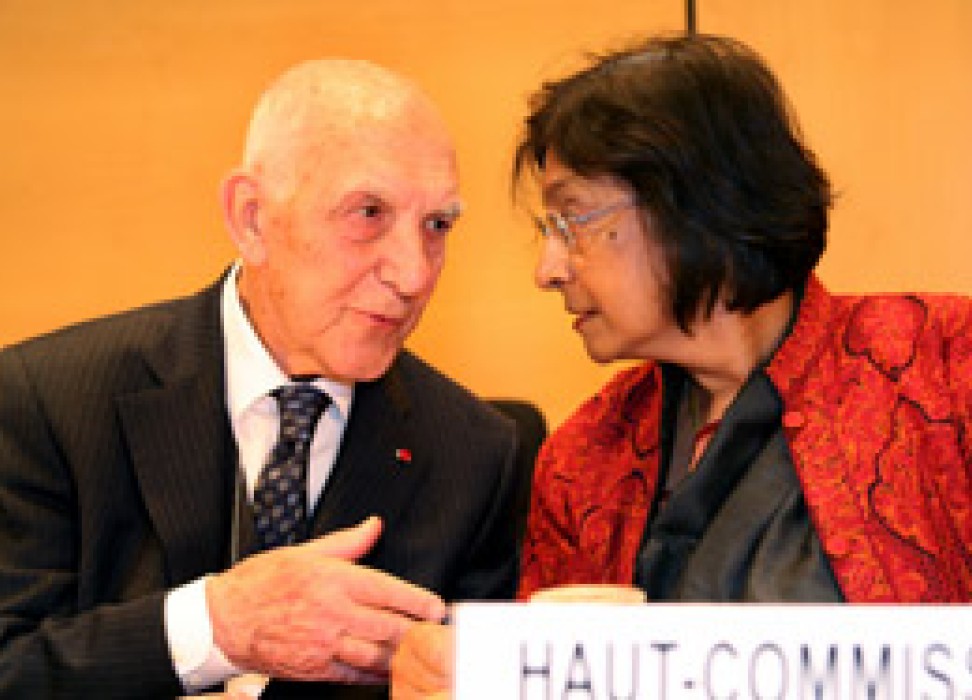Stéphane Hessel – human rights champion dies at 95
27 February 2013

“After 93 years, it is almost the final act.” The opening words of Stéphane Hessel’s best-selling manifesto, “Time for outrage: Indignez-vous!”. His 12 page book was a run-away best-seller, selling millions of copies and has been translated from the original French into many languages.
Publication of his ‘little book’ was the final act in a life spent championing human rights, a life underwritten by his experiences as a French Resistance fighter against the Nazis and the time he spent as a prisoner in concentration camps.
The basic motive of the Resistance, Hessel wrote, was indignation and he called on the youth of today to “take our place”. Indifference, he wrote, is “the worst of attitudes”.
Hessel was born in 1917 in Germany and moved to France at the age of 7. He became a French citizen and in 1941 joined the Free French Forces. Arrested by the Gestapo, he was incarcerated in concentration camps, and tortured. He want onto a stellar career in French public life. Hessel was closely involved with the team that drafted the Universal Declaration of Human Rights.
Resistance fighter, diplomat, writer, human rights defender, Stéphane Hessel died overnight 26/27 February at the age of 95.
The UN High Commissioner for Human Rights Navi Pillay has paid tribute to “a great thinker and a remarkable man.”
"Stéphane Hessel was a towering figure in the human rights world. His work on the Universal Declaration alone is enough to earn a place of honour in global history. But he went on to do so much more, and kept contributing to the advancement of human rights well into his nineties,” Pillay said.
“He supported the core human rights principles with a fierce integrity and never allowed politics or personal history to cloud his judgement on major, unpopular issues such as migration and racism," she said.
At the Human Rights Council meeting in Geneva, delegates observed a moment’s silence. The President of the Council and Permanent Representative of Poland to the UN in Geneva, Remigiusz Achilles Henczel, described him as a "monumental figure in the human rights movement, one of the drafters of the Universal Declaration, and the leading representative at the Commission of Human Rights. His life will continue to inspire us in our work."
In December of 2012, in an interview given to UNESCO, Hessel, commenting on the state of human rights said that he was “particularly worried because global society is still stricken by conflicts, rivalries and tensions – religious, ethnic and between different civilizations.”
“We have not yet found a way to live together on this small planet, showing each other the respect and consideration every human being deserves,” he said.
Nonetheless, he took heart from the success of “Time for outrage: Indignez-vous!” which is also credited with having inspired many of those who turned out for the global protests which sprang up in cities and towns in the midst of the worst economic downturn in decades.
Realizing that time was short, he turned for help to the young people around him. In a 2011 interview, Hessel explained what he meant when he said indifference was “the worst of attitudes”.
“I was worried that so many young people in all our countries seem to have forgotten their responsibility for values. They are just responsible to find a flat, to get some money, to have material wealth. And they do not realize that that is going to be jeopardized if the basic democratic values are not fought for,” he said.
“To those who will make the 21st centry, we say with our affection: To create is to resist; To resist is to create.” Those are the final words in Stéphane Hessel’s “little book”.
27 February 2013

VIEW THIS PAGE IN:
